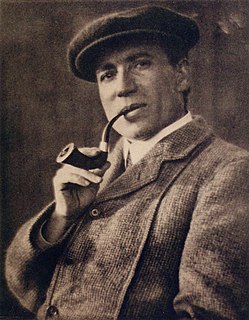Top 39 Quotes & Sayings by W. H. Davies
Explore popular quotes and sayings by a Welsh poet W. H. Davies.
Last updated on April 14, 2025.
Mother's father and brothers all took great interest in pugilism, and they knew the game well from much practice of their own. They were never so much delighted as when I visited them with a black eye or a bloody nose, at which time they would be at the trouble to give cunning points as to how to meet an opponent according to his weight and height.
I had now been in the United States of America something like five years, working here and there as the inclination seized me, which, I must confess, was not often. I was certainly getting some enjoyment out of life, but now and then the waste of time appalled me, for I still have a conviction that I was born to a different life.
Being in this fine mood, I spoke to a little boy, whom I saw playing alone in the road, asking him what he was going to be when he grew up. Of course I expected to hear him say a sailor, a soldier, a hunter, or something else that seems heroic to childhood, and I was very much surprised when he answered innocently, 'A man.'
Summer boarders often left clothes behind, and of what use were they to the landladies, for no rag-and-bone man ever called at their houses. The truth of the matter was that in less than a week I was well dressed from head to foot, all of these things being voluntary offerings, when in quest of eatables.
When on a summer's morn I wake,
And open my two eyes,
Out to the clear, born-singing rills
My bird-like spirit flies.
To hear the Blackbird, Cuckoo, Thrush,
Or any bird in song;
And common leaves that hum all day
Without a throat or tongue.
And when Time strikes the hour for sleep,
Back in my room alone,
My heart has many a sweet bird's song -
And one that's all my own.
Yes, I will spend the livelong day
With Nature in this month of May;
And sit beneath the trees, and share
My bread with birds whose homes are there;
While cows lie down to eat, and sheep
Stand to their necks in grass so deep;
While birds do sing with all their might,
As though they felt the earth in flight.
I cannot see the short, white curls
Upon the forehead of an Ox,
But what I see them dripping with
That poor thing's blood, and hear the ax;
When I see calves and lambs, I see
Them led to death; I see no bird
Or rabbit cross the open field
But what a sudden shot is heard;
A shout that tells me men aim true,
For death or wound, doth chill me through.
Peace to these little broken leaves, That strew our common ground; That chase their tails, like silly dogs, As they go round and round. For though in winter boughs are bare, Let us not once forget Their summer glory, when these leaves Caught the great Sun in their strong net; And made him, in the lower air, Tremble - no bigger than a star!
What is this life if, full of care,
We have no time to stand and stare.
No time to stand beneath the boughs
And stare as long as sheep or cows.
No time to see, when woods we pass,
Where squirrels hide their nuts in grass.
No time to see, in broad daylight,
Streams full of stars, like skies at night.
No time to turn at Beauty's glance,
And watch her feet, how they can dance.
No time to wait till her mouth can
Enrich that smile her eyes began.
A poor life this if, full of care,
We have no time to stand and stare.























